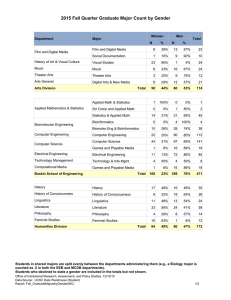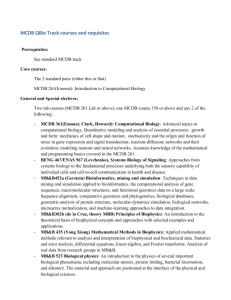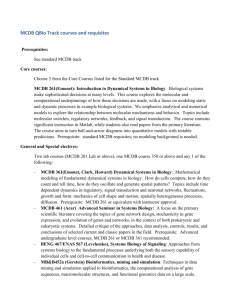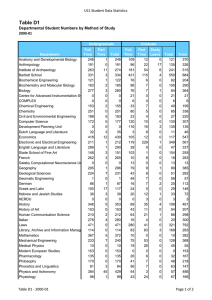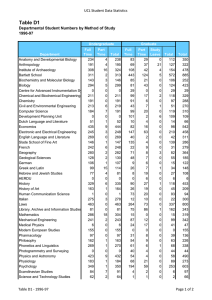Department of Molecular, Cellular, and
advertisement
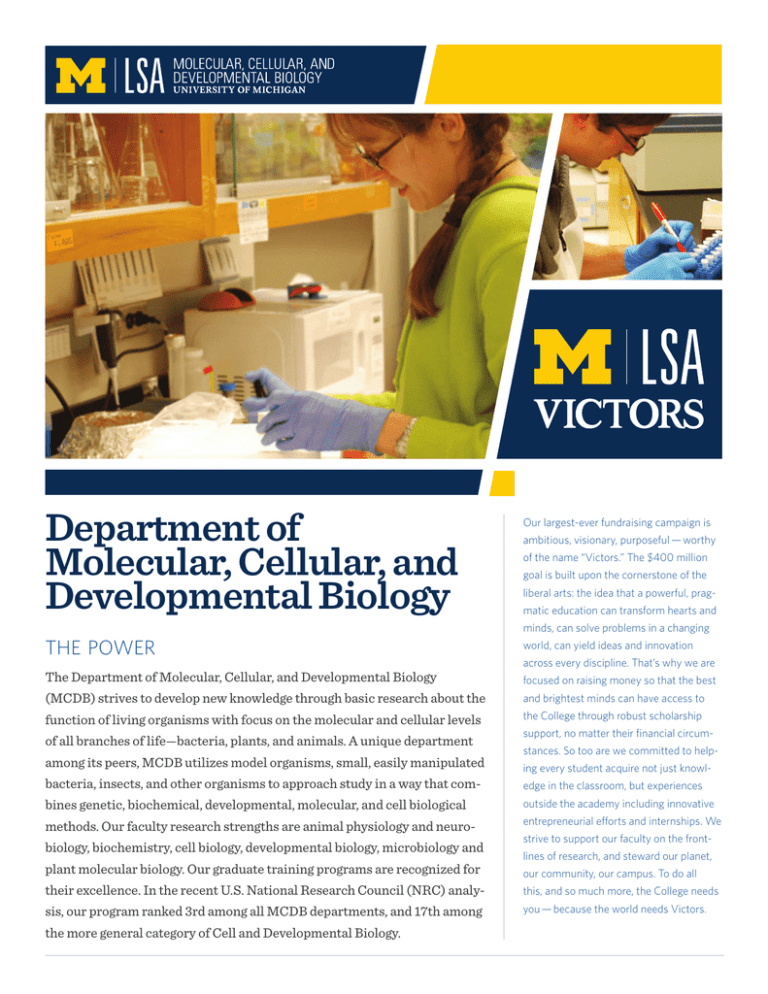
Department of Molecular, Cellular, and Developmental Biology the power The Department of Molecular, Cellular, and Developmental Biology Our largest-ever fundraising campaign is ambitious, visionary, purposeful — worthy of the name “Victors.” The $400 million goal is built upon the cornerstone of the liberal arts: the idea that a powerful, pragmatic education can transform hearts and minds, can solve problems in a changing world, can yield ideas and innovation across every discipline. That’s why we are focused on raising money so that the best (MCDB) strives to develop new knowledge through basic research about the and brightest minds can have access to function of living organisms with focus on the molecular and cellular levels the College through robust scholarship of all branches of life—bacteria, plants, and animals. A unique department among its peers, MCDB utilizes model organisms, small, easily manipulated bacteria, insects, and other organisms to approach study in a way that combines genetic, biochemical, developmental, molecular, and cell biological methods. Our faculty research strengths are animal physiology and neurobiology, biochemistry, cell biology, developmental biology, microbiology and plant molecular biology. Our graduate training programs are recognized for their excellence. In the recent U.S. National Research Council (NRC) analysis, our program ranked 3rd among all MCDB departments, and 17th among the more general category of Cell and Developmental Biology. support, no matter their financial circumstances. So too are we committed to helping every student acquire not just knowledge in the classroom, but experiences outside the academy including innovative entrepreneurial efforts and internships. We strive to support our faculty on the frontlines of research, and steward our planet, our community, our campus. To do all this, and so much more, the College needs you — because the world needs Victors. the impact To ensure that important basic research thrives at the University of Michigan, MCDB seeks support to create a Laboratory for Biological Imaging. In addition, gifts are needed to provide undergraduates with opportunities for hands-on research, and to encourage diversity in the biological sciences by helping qualified students receive the support they need to become successful scholars and researchers. These initiatives and more will ensure that MCDB remains a leader in the disci- the opportunities Because of our research accomplishments and commitment to education, MCDB is responsible for educating most of the University of Michigan undergraduates who will become the next generation of physicians, bio- pline contributing to the field at large. LABORATORY FOR BIOLOGICAL IMAGING $4.5M TO NAME $2M endowed/$2.5M expendable to launch The study of life at the molecular and cellular levels has been revolutionized by recent developments in imaging technologies that allow for unprecedented resolution at microscopic scale in living organisms, which is essential to understand how genomes create cells, how cells constitute organisms and how errant cells cause disease. MCDB plans to build a core facility with modern instrumentation to support research to visualize and understand four-dimensional molecular and cellular functions in living organisms. Funding for this initiative will enhance significantly our technical capability for cutting-edge research in neuroscience, cell and developmental biology, and genetics. The Laboratory for Biological Imaging will provide currently unavailable capabilities for imaging live organisms and will enhance the research infrastructure of the University of Michigan. medical and plant researchers, and scientists. Undergraduates have the option of concentrating their study in a variety of areas, including Cellular and Molecular Biology, Neuroscience, Microbiology, and Plant Biology. By providing our students with a curriculum that exposes them to the newest ideas of world-class scientists, and lets them participate in the research experience to make their own discoveries, we prepare them for positions of leadership in their professions. Our undergraduates are equipped for positions in medical, industrial, and government laboratories, or in teaching or health professions. Others pursue graduate study in microbiology, biochemistry, agricultural science, genetics, brain research, food science, and medicine. As To Launch: n New imaging equipment and upgrades to existing equipment: $2.5M expendable Additional Requirements for Laboratory: advances in the life sciences set the stage for extraor- dinary new discoveries about the molecular basis of n Senior technical staff: $50,000 annually/ $1M endowed life and its application to medicine, agriculture, and n Trainee support for graduate and undergraduate students: wildlife conservation, the endeavors of our faculty and students have never been more significant. $50,000 annually/ $1M endowed RESEARCH INNOVATION FUND FOR 21ST CENTURY BIOLOGICAL SCIENCE $1M to $5M endowed Faculty who have innovative ideas and new hypotheses need a reliable source of internal research funding to generate preliminary data that can be used to develop grant proposals. The Research Innovation Fund will support pilot funding to launch new research projects, including stipend support for graduate students and postdoctoral fellows. program including tuition, room and board, books and expenses: $600,000 annually at $7,500 per student for 80 student cohort nResearch stipend for students in second summer program: $400,000 annually at $5,000 per student for 80 student cohort nProgramming costs for academic year: $10,000 annually for field trips, workshops, and speakers nProgramming and staffing costs for first-year residential summer program: $75,000 annually for peer advisors, residential staff, and summer programming M-STEM ACADEMIES nAcademic coaches for summer and academic year for $1.2M annually for 5 years 80 students per cohort: $40,000 annually The M-STEM (Michigan-Science, Technology, Engineering, Mathematics) Academies provide an integrated, holistic co-curricular support system for students who have been admitted to U-M with high ability and potential in science, mathematics, or engineering. Students are invited to apply who come from a wide diversity of backgrounds that suggest they are uniquely suited to collaborate across differences. M-STEM is a cross-university collaboration between LSA and the College of Engineering. Currently LSA students in M-STEM focus their study in the biological sciences, but the College plans to expand the program to cover all the natural sciences in LSA, including physics, biophysics, chemistry, astronomy, earth and environmental sciences, and mathematics. M-STEM Scholars participate in a pre-freshman year residential summer bridge program with the dual goals of preparing them for the new expectations and requirements of rigorous college science and mathematics courses and establishing the social and academic support networks essential for their success. They also engage in research beginning in their first or second semester. Many students participate in a research or internship experience during the summer between their first and second years. Scholarship support for the academic year, summer bridge program, and summer research experience is essential to allow M-STEM Scholars to fully invest their time and effort in academic pursuits. M-STEM Academies was awarded a grant for seed funding from the National Science Foundation, which covered costs for course development and initial staffing and student support. Private funding is critical to enable the M-STEM Academies to continue and expand to include students in all of the natural sciences. Costs for the program include: CONTACT INFO Development, Marketing, and Communications, College of LSA nScholarship support for students in first-year summer bridge 500 South State Street, Ste 5000 Ann Arbor, Michigan 48109-1382 nProgram director: $100,000 annually UNDERGRADUATE SUMMER RESEARCH FELLOWSHIPS $50,000 annually/$5,000 per student One distinction of an LSA undergraduate education is the opportunity to gain scientific research experience working with teams of faculty and graduate students. The success of the Undergraduate Research Opportunities Program (UROP) has been amply validated, but it is limited to first- and second-year students. MCDB faculty also provide research experiences for juniors and seniors. Gifts to provide summer research fellowships for undergraduate students working on research projects in MCDB laboratories will enable many more to benefit from this active learning experience. BIOLOGY: FROM MOLECULES TO ORGANISMS $10,000 to $50,000 annually In partnership with the Museum of Natural History, we plan to develop a 21st century public outreach program for MCDB, in conjunction with the renovation of Ruthven. This initiative would interface with and support NSF-funded research of MCDB faculty and would enhance recruitment of undergraduate students from underserved areas of Michigan into biology. WAYS TO FUND YOUR GIFT Your gifts of cash, pledges, or appreciated securities change lives. Wills, estate, and planned gifts allow you to create a lasting legacy that will enable the best and brightest minds to experience a liberal arts education, solve problems in a changing world, and yield ideas and innovations that will make a difference in Michigan and around the globe. P.734.615.6333 F.734.647.3061 www.lsa.umich.edu www.lsa.umich.edu/mcdb
